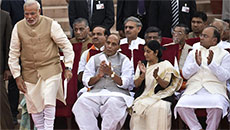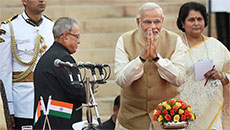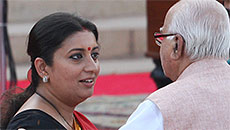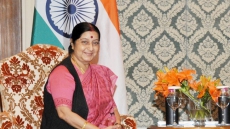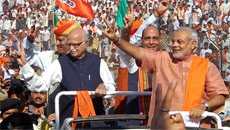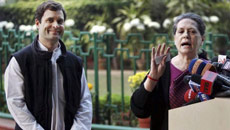As parliament Wednesday debated the communal violence bill, the Congress launched an all-out attack on the Narendra Modi government, with party president Sonia Gandhi alleging an "alarming increase in the number of incidents of communal violence" since the BJP came to power.
Mallikarjun Kharge, Congress party leader in the Lok Sabha, said more than 600 incidents of communal violence had been orchestrated to polarise voters.
Addressing the Congress Parliamentary Party in the Central Hall of parliament, Gandhi said there was a growing concern, particularly among women and minorities, on whether the Bharatiya Janata Party was seeking to "profit from dividing the country on sectarian lines".
"There is a great deal of concern in the country, particularly among women and minorities, the poor, about whether the BJP and its sister organisations mean to work for all of India's communities, or whether they seek to profit from dividing the nation on sectarian lines," Gandhi said.
She added that the BJP showed in its 10 weeks in power that it was governing "without policies".
Gandhi drew a connection between the rise in communal violence and radical utterances by some BJP leaders.
"Already since the BJP has come to power, there has been an alarming increase in the number of incidents of communal violence. In addition, there have been other subtle but pernicious signals of intolerance," Gandhi said, addressing the Congress MPs, which included former prime minister Manmohan Singh.
Her views were carried forward in parliament by Kharge.
"There is an ongoing attempt to suppress the minorities in the country, so that they disassociate themselves from mainstream politics," Kharge said, opening a discussion on communal violence in the Lok Sabha on behalf of his party.
He further alleged that "in whichever states elections were approaching, there was an increase in communal violence".
As soon as the Lok Sabha assembled in the morning, Congress members demanded that a discussion on incidents of communal violence should be taken up immediately.
Kharge complained that though his party had given a notice for a discussion on the matter at least a fortnight back, the debate was yet to take place.
"There are riots taking place in states which are to go for elections or by-polls. In Uttar Pradesh, more than 600 incidents of communal violence were orchestrated to polarise the voters," Kharge said.
He claimed that according to government data, 113 incidents of communal violence took place in May and June after the BJP-led government was sworn in.
Congress vice president Rahul Gandhi, who had led an unprecedented noisy protest Aug 6 against rising incidents of communal violence, was seen listening attentively when the debate took place.
BJP MP from Gorakhpur Yogi Adityanath rebutted the allegations strongly, arguing there were many Congress-ruled states which had been witnessing communal incidents.
"Though law and order is a state government affair, if they (Congress) would have analysed truthfully, they would have found why polarisation is taking place," Adityanath said.
He alleged that the Uttar Pradesh government has taken back cases against terrorists and allotted special funds for paying salaries of Islamic teachers.
"They (opposition parties) never raised a voice when Kashmiri Hindus were displaced, they never raised it when Assam riots took place," he said, adding that the truth was always bitter.
PDP's Mehbooba Mufti countered his argument, saying that in Jammu and Kashmir "50,000 Muslims too have been killed" and that it was "unfortunate" that political parties were more interested in point scoring of how many communal incidents took place in whose reign rather than try and find a solution to it.
Trinamool Congress' Sudip Bandopadhyay said it was the responsibility of the government to stop incidents of communal violence.
RJD MP Pappu Yadav elicited protests when he named BJP president Amit Shah in the house and said that right wing organisations were responsible for incidents of communal violence.
Besides the issue of communal violence, Sonia Gandhi also took on the BJP for "imitating" Congress policies which they had "hypocritically" opposed earlier.
"The new government now supports the proposed Goods and Services Tax, sugar subsidies, railway and diesel price hikes, FDI in insurance, the Aadhaar scheme, and other key UPA budget measures, all of which they had bitterly, and, if I might add hypocritically, denounced, obstructed and prevented progress on when they were where we are today," she said.
Gandhi also said that the ruling party even tried to prevent a discussion on Gaza in parliament and then ended up voting at the UN Human Rights Council just as the UPA would have.
Noting that the Congress has been reduced in numbers to an all-time low in the Lok Sabha, Gandhi, however, said they have not been reduced "in spirit".
The Congress tally in the Lok Sabha is 44, sharply down from its 206 in the 15th Lok Sabha.
She said the party will continue to play the role of a "vigilant opposition" and will "resist the authoritarian and sectarian tendencies" of the new government as it tries to get its way in parliament.
